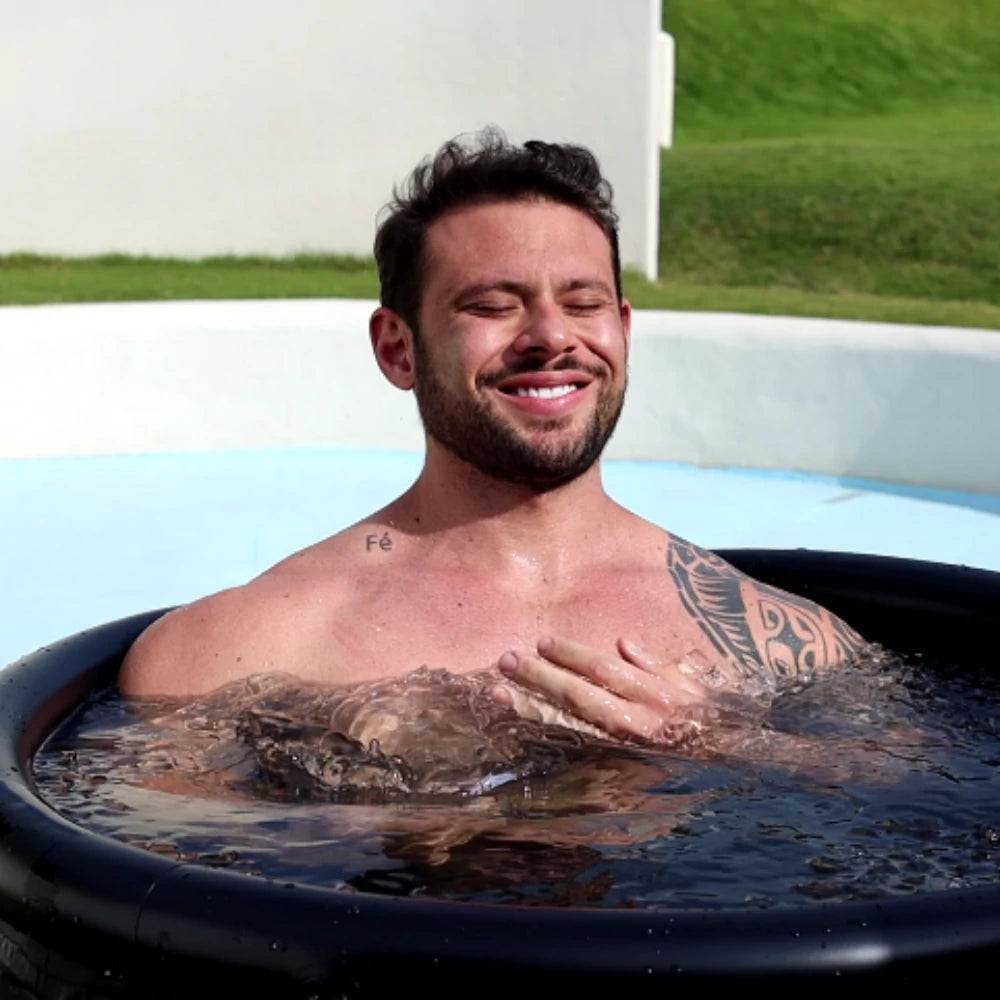Cold exposure, such as through ice baths, has been shown to decrease levels of cortisol, the body's primary stress hormone. Regular immersion in cold water can lead to a more balanced hormonal response, helping to reduce overall stress and anxiety levels. Additionally, the shock of cold water can trigger the release of endorphins, the body's natural "feel-good" chemicals, which can elevate mood and promote a sense of well-being【1】.

Improvement in Mood and Mental Clarity
Ice baths can lead to immediate improvements in mood due to the release of norepinephrine, a neurotransmitter that plays a key role in mood regulation. This boost in norepinephrine levels can enhance mental clarity and focus, helping you feel more alert and mentally sharp after a session in cold water【2】.

Enhanced Resilience to Stress
Regular exposure to cold water can enhance your body's resilience to stress by improving the autonomic nervous system's response. This can result in a more balanced reaction to stressors, making you less susceptible to the negative effects of stress over time. The practice of enduring the initial discomfort of cold water can also build mental toughness and improve your ability to cope with challenging situations【3】.

Reduction in Inflammation and Improved Recovery
Ice baths are well-known for their ability to reduce inflammation and speed up physical recovery, which can also have indirect benefits for mental health. Reduced inflammation can lead to lower levels of physical discomfort and fatigue, which are often linked to mental health issues like depression and anxiety. By aiding in quicker recovery, ice baths can help you maintain a more active and healthy lifestyle, further contributing to mental well-being【4】.

Better Sleep
Cold exposure before bedtime can improve the quality of your sleep by lowering your core body temperature, which is a natural signal for your body to prepare for sleep. Better sleep is crucial for mental health, as it allows your brain to rest and repair, leading to improved mood, cognitive function, and overall emotional stability【5】【6】.

Promotion of Mindfulness and Present Moment Awareness
Engaging in ice baths requires a level of mental focus and presence, which can promote mindfulness. The intense cold forces you to concentrate on your breathing and stay in the present moment, which can help reduce rumination and promote a more mindful state of being. This practice can be particularly beneficial for those struggling with anxiety and depression, as it provides a break from negative thought patterns and fosters a sense of mental calm and clarity.

Conclusion
Integrating ice baths into your wellness routine can provide substantial mental health benefits, from reducing stress and anxiety to improving mood and sleep quality. If you're interested in exploring the benefits of ice baths further, check out these related articles on our blog:
The Science Behind Cold Water Immersion and Oxidant-Antioxidant Levels.
Ice Bath Benefits: How to Maximize Recovery Like a Celebrity?
https://halrove.com/blogs/comprehensive-health-tips-for-a-better-you/ice-bath-benefits-how-to-maximize-recovery-like-a-celebrity
Ice Baths for Fat Loss: Separating Fact from Fiction
https://halrove.com/blogs/comprehensive-health-tips-for-a-better-you/ice-baths-for-fat-loss
Can You Cold Plunge While Pregnant? Understanding the Benefits and Risks
https://halrove.com/blogs/comprehensive-health-tips-for-a-better-you/cold-plunge-while-pregnant
Taking An Ice Bath Safely in Summer 2024 | A Beginner's Guide to Cold Water Immersion
https://halrove.com/blogs/comprehensive-health-tips-for-a-better-you/ice-bathing-tips-summer-2024
Why Do Sigma Males Embrace Ice Baths After Morning Workouts?
https://halrove.com/blogs/wellness-industry-trends/sigma-males-ice-baths-benefits
The Ultimate Guide to Picking the Perfect Foldable Portable Ice Bath Tub
https://halrove.com/blogs/outdoor-adventure-guides/how-to-quickly-choose-a-foldable-portable-ice-bath-tub
By exploring these articles, you can gain a comprehensive understanding of how ice baths can be a powerful tool for enhancing both physical and mental health.

References
Moore, E., Fuller, J., Buckley, J., Saunders, S., Halson, S., Broatch, J. R., & Bellenger, C. R. (2022). Impact of Cold-Water Immersion Compared with Passive Recovery Following a Single Bout of Strenuous Exercise on Athletic Performance in Physically Active Participants: A Systematic Review with Meta-analysis and Meta-regression. Sports Medicine, 52, 1667-1688.
Xiao, F., Kabachkova, A. V., Jiao, L., Zhao, H., & Kapilevich, L. (2023). Effects of cold water immersion after exercise on fatigue recovery and exercise performance--meta analysis. Frontiers in Physiology, 14.
Yankouskaya, A., Williamson, R., Stacey, C., Totman, J., & Massey, H. (2023). Short-Term Head-Out Whole-Body Cold-Water Immersion Facilitates Positive Affect and Increases Interaction between Large-Scale Brain Networks. Biology, 12.
Nurusyaikhi, M., Sugiyanto, S., & Nugroho, H. (2023). Cold Water Immersion Therapy for Post-Exercise Recovery: Systematic Literature Review. PROSIDING SEMINAR NASIONAL PENDIDIKAN JASMANI DAN KEOLAHRAGAAN.
Jones, B., Waterworth, S., Tallent, J., Rogerson, M., Morton, C., Moran, J., Southall-Edwards, R., Cooper, C., & McManus, C. (2023). Influence of cold-water immersion on lower limb muscle oxygen consumption, as measured by near-infrared spectroscopy. Journal of Athletic Training.
Yankouskaya, A., Williamson, R., Stacey, C., Totman, J., & Massey, H. (2023). Short-Term Head-Out Whole-Body Cold-Water Immersion Facilitates Positive Affect and Increases Interaction between Large-Scale Brain Networks. Biology, 12.



